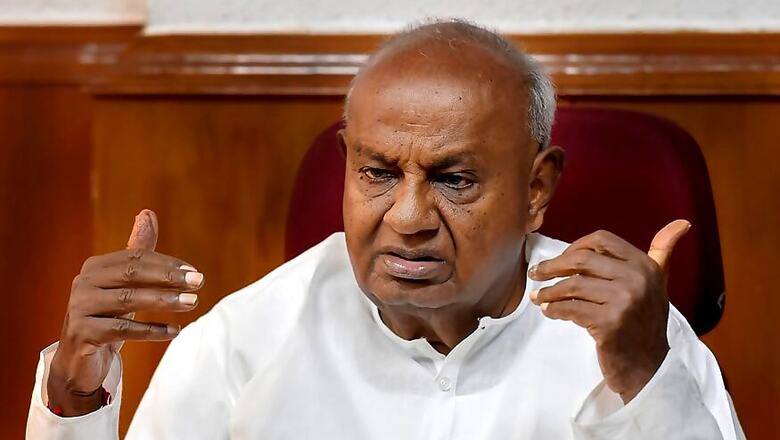
views
Bengaluru: A tough battle appears to be on the cards for JDS patriarch H D Deve Gowda in Tumkur Lok Sabha constituency as he is contesting from a Congress bastion amid disquiet in both his party and ally Congress over allocation of seats and tickets, say analysts.
They, however, do acknowledge the former prime minister's potential to bounce back as he did by winning the Kanakapura byelection in 2002 after he had lost to G Puttaswamy Gowda of Congress in 1999 from Hassan.
Though Tumkur was allotted to JDS under the electoral arrangement between allies Congress and JD(S), sitting Congress MP S P Muddahanume Gowda has filed his papers from the seat, making it clear that Deve Gowda may not have an easy going.
It remains to be seen if Muddahanume Gowda remains in the contest but on Monday he appeared firm on giving a fight. "I'm filing my nomination as the Congress candidate. I'm not filing the nomination for fun," he said
According to reports, K N Rajanna, another Congress leader and former MLA, has also filed his nomination on Monday from Tumkur as an independent candidate.
The Congress and BJP candidates have won ten and four times from the same constituency. It was a Congress stronghold from 1952 to 1989, till it lost ground to the BJP.
G S Basavaraj is the BJP candidate. He had won three times before on Congress ticket and once on BJP ticket. He was defeated by Muddahanume Gowda in 2014 elections.
"Deve Gowda faces a tough fight in Tumkur. There is already disquiet in Janata Dal (Secular) about how the family is being given importance.
"Defeat of Anita Kumaraswamy (daughter-in-law of Deve Gowda) twice from Ramnagaram constituency is quite fresh in people's mind," political analyst Sandeep Shastri told PTI here.
The Vokkaliga leader has fielded his grandsons Nikhil K and Prajwal Revanna from Mandya and Hassan respectively. This has apparently left some of the senior JDS leaders, who were hopeful of getting tickets, unhappy.
Ticket denial by Congress to Muddahanume Gowda has created some discontentment within local Congress leadership. Deputy Chief Minister G Parameshwara, who is a prominent leader from Tumkur, had met Deve Gowda and requested him to return the seat to Congress if he was not contesting from the constituency.
A section of local Congress leaders fears that giving Deve Gowda a chance to contest from Tumkuru would be like giving their bastion on a platter to JDS.
Harish Ramaswamy, political science professor at Karnatak University (Dharwad) and Shastri do not deny Deve Gowda's capability to bounce back as he had done earlier.
"Deve Gowda has all the capacity to bounce back. If you remember he had lost Kanakapura Lok Sabha seat in 1999 to G Puttaswamy of the Congress, but bounced back by winning the same seat in 2002 byelection. Deve Gowda could register a win in Congress backyard Kanakapura because he is a charismatic leader," he said.
Ramaswamy said the Congress had been pushing for Deve Gowda to contest from Bengaluru North constituency, but Deve Gowda opted for Tumkur, may be because of the presence of more MLAs from JDS than Congress in the constituency, Ramaswamy said.
"In Bengaluru North, the Congress and the JDS have five and two MLAs respectively, but the Congress holds just one Assembly segment in Tumkuru and JDS three. Deve Gowda could have considered this point before making the decision to contest from Tumkuru," he said.
Moreover, Deve Gowda would have been wary of the earlier defeat in Kanakapura as some parts of it now form the Bengaluru North constituency, Ramaswamy argued.
Also, the JDS think tank feels people would prefer Deve Gowda over Muddahanume Gowda, as the former prime minister is a more prominent Vokkaliga leader, he said.
"Deve Gowda is also known for playing emotional card to woo people," Ramaswamy said.
Tumkur district comes under the Old Mysore region. The JDS has not won an MP seat from there, but C N Bhaskarappa had won in 1996 as undivided Janata Dal candidate.
Tumkur constituency, a dryland region, is spread over 6,706 sq.km. It had 15,94,703 registered voters - 7,97,512 males and 7,97,191 females - till January 2019.














Comments
0 comment